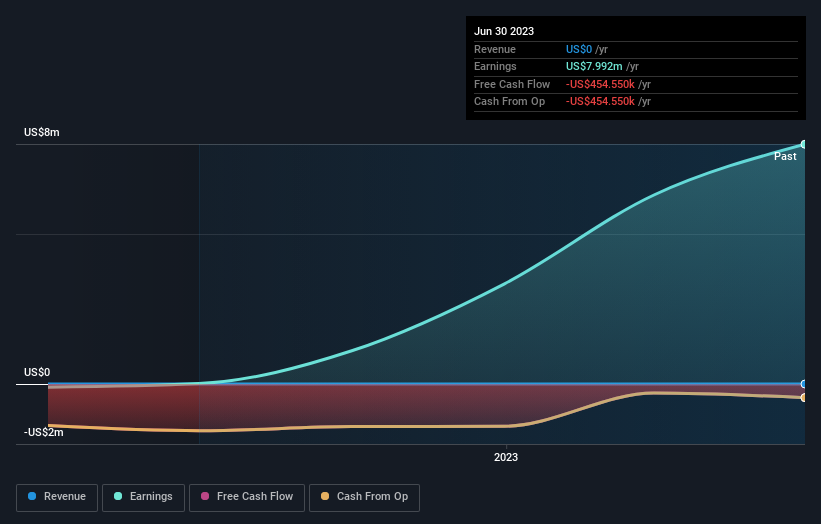PowerUp Acquisition Corp.'s (NASDAQ:PWUP) largest shareholders are individual investors with 45% ownership, private companies own 32%
Key Insights
Significant control over PowerUp Acquisition by individual investors implies that the general public has more power to influence management and governance-related decisions
The top 12 shareholders own 52% of the company
If you want to know who really controls PowerUp Acquisition Corp. (NASDAQ:PWUP), then you'll have to look at the makeup of its share registry. With 45% stake, individual investors possess the maximum shares in the company. Put another way, the group faces the maximum upside potential (or downside risk).
Private companies, on the other hand, account for 32% of the company's stockholders.
In the chart below, we zoom in on the different ownership groups of PowerUp Acquisition.
See our latest analysis for PowerUp Acquisition
What Does The Institutional Ownership Tell Us About PowerUp Acquisition?
Institutional investors commonly compare their own returns to the returns of a commonly followed index. So they generally do consider buying larger companies that are included in the relevant benchmark index.
We can see that PowerUp Acquisition does have institutional investors; and they hold a good portion of the company's stock. This suggests some credibility amongst professional investors. But we can't rely on that fact alone since institutions make bad investments sometimes, just like everyone does. It is not uncommon to see a big share price drop if two large institutional investors try to sell out of a stock at the same time. So it is worth checking the past earnings trajectory of PowerUp Acquisition, (below). Of course, keep in mind that there are other factors to consider, too.
PowerUp Acquisition is not owned by hedge funds. The company's largest shareholder is PowerUp Sponsor LLC, with ownership of 32%. For context, the second largest shareholder holds about 2.9% of the shares outstanding, followed by an ownership of 1.7% by the third-largest shareholder.
Looking at the shareholder registry, we can see that 52% of the ownership is controlled by the top 12 shareholders, meaning that no single shareholder has a majority interest in the ownership.
Researching institutional ownership is a good way to gauge and filter a stock's expected performance. The same can be achieved by studying analyst sentiments. As far as we can tell there isn't analyst coverage of the company, so it is probably flying under the radar.
Insider Ownership Of PowerUp Acquisition
While the precise definition of an insider can be subjective, almost everyone considers board members to be insiders. Management ultimately answers to the board. However, it is not uncommon for managers to be executive board members, especially if they are a founder or the CEO.
Most consider insider ownership a positive because it can indicate the board is well aligned with other shareholders. However, on some occasions too much power is concentrated within this group.
Our data cannot confirm that board members are holding shares personally. Not all jurisdictions have the same rules around disclosing insider ownership, and it is possible we have missed something, here. So you can click here learn more about the CEO.
General Public Ownership
The general public-- including retail investors -- own 45% stake in the company, and hence can't easily be ignored. While this group can't necessarily call the shots, it can certainly have a real influence on how the company is run.
Private Company Ownership
It seems that Private Companies own 32%, of the PowerUp Acquisition stock. It's hard to draw any conclusions from this fact alone, so its worth looking into who owns those private companies. Sometimes insiders or other related parties have an interest in shares in a public company through a separate private company.
Next Steps:
I find it very interesting to look at who exactly owns a company. But to truly gain insight, we need to consider other information, too. For instance, we've identified 2 warning signs for PowerUp Acquisition (1 shouldn't be ignored) that you should be aware of.
Of course, you might find a fantastic investment by looking elsewhere. So take a peek at this free list of interesting companies.
NB: Figures in this article are calculated using data from the last twelve months, which refer to the 12-month period ending on the last date of the month the financial statement is dated. This may not be consistent with full year annual report figures.
Have feedback on this article? Concerned about the content? Get in touch with us directly. Alternatively, email editorial-team (at) simplywallst.com.
This article by Simply Wall St is general in nature. We provide commentary based on historical data and analyst forecasts only using an unbiased methodology and our articles are not intended to be financial advice. It does not constitute a recommendation to buy or sell any stock, and does not take account of your objectives, or your financial situation. We aim to bring you long-term focused analysis driven by fundamental data. Note that our analysis may not factor in the latest price-sensitive company announcements or qualitative material. Simply Wall St has no position in any stocks mentioned.

 Yahoo Finance
Yahoo Finance 

